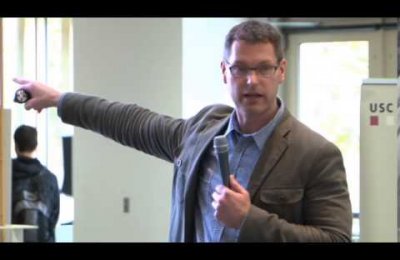By Michael Juliani
On Nov. 22, 1963, shortly after President John F. Kennedy had been shot in Dallas, Lori Sands Wagner’s father was in the newsroom of CKLW, a TV and radio station in Detroit, viewing the teletype scroll of The Associated Press wire. As details came arrived in spurts from Dallas, Wagner’s father, a reporter, ripped the scroll of teletype off the press and stashed it.
Fifty years later, when Wagner, the mother of USC freshman Jackson Wagner, learned that USC Annenberg would be hosting a Journalism Forum focusing on JFK, she contacted the school to see if the department would be interested in displaying the stretch of scroll her father had saved.
On Tuesday, Nov. 19, Professor Richard Reeves, one of the leading Kennedy experts in the world, discussed the doomed president’s three years in office and the impact they had on American life, in conversation with Professor Judy Muller. Reeves concluded that JFK’s deepest impact on American culture stemmed from the president’s new form of ambition – “He did not wait his turn,” Reeves said. This public display of ruthless initiative to win the seat in the Oval Office influenced the prevailing undercurrents of the 1960s, Reeves said.

Reeves edited a book last month that collects some of the New York Times’ best writing about JFK, The Kennedy Years: From the Pages of the New York Times. Reeves was the senior political correspondent for the Times and has written books about many American presidents, including Nixon, Reagan, Clinton and past books about Kennedy.
“The presidents with the greatest intellect – Nixon, Carter, Obama, for example – often don’t fare as well as someone like Truman, who acts more on impulse,” Reeves said. “I develop great sympathy for presidents, even ones I greatly dislike.”
Though public opinion greatly favors JFK – especially among people ages 18 to 25, which Reeves attributes to the nostalgia of their parents’ generation – Reeves said that journalistic and historians’ opinions about JFK have declined. Reeves rates JFK at the top of the second echelon of American presidents.
“The president brings out the best or worst from the American people,” Reeves said, “and Kennedy brought out the best.”
After Reeves’ talk, Muller questioned a couple of students in the audience about why they think JFK appeals so much to young people. In the age of celebrity in which we live, the students agreed, the Kennedy family attracts the American adoration for glamor, grace and intrigue – i.e. young people admire JFK regardless of politics.
In the Geoffrey Cowan Forum, where the journalism forums are held, USC Annenberg is displaying mounted photographs by photojournalist Lawrence Schiller. Schiller’s photographs drill into the direct essence of the ruthless, apocalyptic ambition that JFK invoked. The exhibit will run until May. One of the featured images shows Lee Harvey Oswald’s rifle being held up for photographers to capture – Schiller was the only photographer to shoot the scene from behind the back of the police officer who held up the gun.
Reeves said that TV, film and media archives of Kennedy are the reasons why JFK’s mystique has continued to grow. “As long as that survives, the Kennedy legend will too, and I suspect it will survive forever.”
(Photos by Alan Mittelstaedt)








